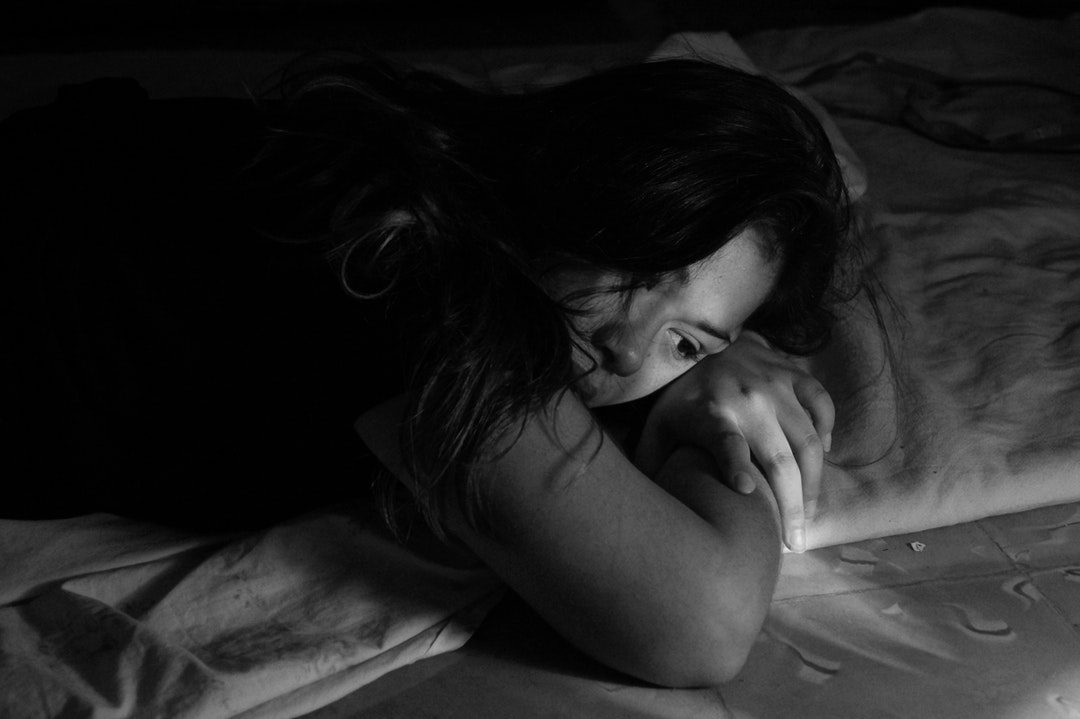I deserve to die.
The reality hit me in a crashing wave of guilt as I spent two hours listening to my youngest sister catalogue for me all of the ways in which I had wronged her. I’m not talking about petty things that siblings do to each other sometimes. No, she was recounting significant ways in which I had hurt her, whether mentally or emotionally, and the impact it had had on her.
Not once did she ever get visibly angry or upset. Rather, she was eerily calm the entire time, as though she were a vision from the past coming back to haunt me. As she spoke, the gravity of how I had treated her kept hitting me square in the gut. Like a criminal receiving their death sentence on trial, I knew that I was done for. It was also the first time that I experienced the full weight of my sin and wrongdoings, as well as a recognition of the course of destruction it leaves on others. Once I was back in my room, I lay awake, numb, unable to find peace, drowning in the sorrows of what I had done.
This was one of many moments where I sank deeper into despair, as guilt and shame crippled me.
I became apathetic to everyone and everything around me. I lost the ability to see any sort of goodness in humanity. I felt aimless and purposeless. Every time I tried to look for a reason to live, I came up short-handed. I kept up a good façade, but I was exhausted: physically, mentally, and emotionally. During this period of bleakness, my faith was also stagnating. I recognized that I was spiralling into a depressive state early on, but refused to speak about how hopeless I felt, due to the stigma surrounding mental health. Instead, I hid my inner battles from the outside world, feeling ashamed, and blaming myself for not being “better.” This was the darkest time of my life.
I felt like I had personally failed as a Christian, since I was questioning so many aspects of who God was, rather than just simply following him, like a “good Christian.”
I believed that Christians needed to have blind, unwavering, and most importantly, unquestioning faith, in order to be good followers of Jesus. As I was unable to check off any of those boxes, I came to the conclusion that there was something inherently wrong with me as a believer.
As I aged out of Sunday school and into youth group, following Jesus seemed anticlimactic. All I needed to do was go to church on Sundays, occasionally pray, read my Bible, and be nice to others. Yet, even though I would regularly fail at accomplishing these things, I was still, somehow, going to go to heaven when I died, because I’d prayed some specific words to God when I was six in order to be forgiven. I’d never really understood what it actually meant to have a relationship with God, nor did I grasp how to apply that to my life. This crucial missing piece left the foundation of my faith weak and vulnerable.
“God, if you are such a loving God, then why am I suffering so much?”
When I was younger, I could never understand why people would ask the question, “If God is so loving, then why is there suffering in the world?” I suppose you could attribute it to how naive I was, but also to how selfish I was, in that I never focused on the feelings and struggles of others. I never realized how deeply personal the question could be for some, until I found myself asking the exact same question.
To say that I resented God would be an understatement. At fourteen years old, my life was rapidly unfolding into a chaotic storm of turbulence as I wrestled with the notion that God loves me, in a reality that seemed so far from that idea. In my suffering, I developed a warped, twisted view of God. I began to view him as being cold, distant, and hateful towards humanity and their pain, and believed him to be anything but loving and compassionate. The smallest things began to irritate me and set me off. I once again became an oppressor, as I lashed out regularly at my family, taking on a new façade of “righteous” anger to disguise how deeply I was hurting on the inside. Somehow, I still held on to a sliver of hope that maybe someone–anyone–would look past the masks I wore, and see the broken, wounded girl who was crying out for salvation from her pain.
For some reason, even though I had given up on myself as being someone whose life was of worth, God never once gave up on me.
At some point, my other sister convinced me to start going back to our youth group. On one of those nights, when we were talking in a small group, one of the other girls began to ask questions about God. It struck me as unusual, in how she had a genuine curiosity to learn more about God, unlike me, who had become jaded and disinterested in anything concerning God. We somehow ended up becoming friends. Both she and my sister worked that summer at a Christian camp, one that my sister and I had been at for the previous two summers. When my sister came home after the first week, I noticed a real change in her. She had a desire for God that I hadn’t seen before. As I began to meet other Jesus followers later that fall, who evidenced a similar desire to know God on a more personal level, I began to lower my walls of resistance to God. In his goodness, he steadily worked on reshaping my views of him.
Yet, I was in a constant state of torment.
The following summer, I decided to work at that Christian camp. But during the first staff training weekend, my emotional and mental battles intensified. I felt woefully out of place as I realized that all of my peers had more experience than me, and somehow had an advantage that I didn’t. I felt left out and insignificant. My anxiety was further magnified as I focused on the strengths of others, rather than looking at how God could use me in my imperfections. I quickly became my own harshest critic, of my abilities as a leader, and who I was as an individual.
My mind was plagued with thoughts that I was a failure and would never be good enough for God. The shame that accompanied this notion made the condemnation even more real to me, just like how I felt after that fateful conversation with my younger sister that one night. I dreaded going to sleep, as the thoughts continued on into the night, more pressing and persistent than they were during the day, and I developed insomnia as a result. I was robbed of being mentally and emotionally present with my campers, as these feelings of insignificance continued to torture me non-stop. I had difficulty focusing on the good things happening around me in the lives of others, as these moments of joy for them would somehow remind me of how meaningless I found my own existence to be. My overall mental well-being depleted rapidly with each passing day, until it felt like I was living in some kind of bleak, dreamlike trance that I would never wake up from. I was frustrated with myself, more than anyone else, completely detached from God in my state of apathy and weariness.
I remember one particular night in week five of the summer. As I lay awake late into the night, the lies I’d been caught up in for the previous few weeks continued on repeat. Strangely enough however, on this night, in the back of my mind, a new thought occurred.

“You should pray.”
Pray? No. “I’m so tired, I just want to sleep, plus it’s so late.” Still, as the never-ending barrage of self-loathing and shame bombarded my mind, the thought of praying also persisted. Finally I hit my breaking point: “You know what? I’m done!” I sat up, climbed down precariously from my bunk, and went out into the hallway to pray. Deep down, I knew that I needed to be honest with God, so I decided to start from the beginning. I figured that I really had nothing left to hide from him, and since he already knew everything, I might as well lay it all out without holding back.
So, I prayed. I detailed how I’d been hurt, and how I’d hurt others. I told God everything. When I finally finished at roughly one in the morning, I can only describe as miraculous what occurred next. The moment I finished praying, the thoughts that had been tormenting me all summer long suddenly faded, and were replaced by an indescribable peace that began to flood my mind. It was as though a bubble of protection had gone up, to prevent the lies from attacking me. I closed my eyes, and to this day, I don’t really know how to describe what happened next, other than as an audible thought.
“Angelina, my child, know that you are loved beyond all that.”
I knew without a doubt that the only logical explanation for all of this was God. Loved beyond all that. All of the anxiety, depression, shame, guilt, hurt, pain, and suffering. Tears cascaded down my face like a flowing river. I went back to my bunk, and had my first peaceful night’s sleep that summer. Somehow, though, I knew that this peace would be only temporary. Sure enough, it left me the next morning, and my feelings of inadequacy returned, just as relentlessly as before.
I was at the end of myself.
I wasn’t sure how much more of this self-induced shame and guilt I could take. I knew I was mentally stuck in a headspace that I didn’t want to be in for the rest of my life, but I couldn’t see a way out, no matter how hard I looked. Due to how mentally and emotionally draining the summer had been, I was certain of one thing though; something in my life needed to change.
The following week, and a couple of days after returning home, I was at such a low point that the idea of things ever getting better was impossible to believe. I had hit rock bottom, and knew what I needed to do this time around. So finally, in the middle of the afternoon, I went to my room, closed the door, and surrendered my life to God. I remember thinking, “God, I need you, ‘cause without you, I have no hope of things ever getting better.” I was desperate for radical change. At that moment, I decided that I was actually going to start living my life for God, and commit myself to growing in my relationship with him. Ten years after first asking God to forgive me for my sins, I finally committed myself to live out the gift that I had accepted all those years ago.
Things didn’t change overnight.
You can’t have a relationship with someone unless both of you invest into cultivating it. Seeing as how God had always been faithful on his part, I knew that I needed to contribute my part to the relationship. I decided to devote myself to praying (or talking to God), every single night. Praying became my way of building a relationship with God, and becoming more reliant on him to grant me peace from my mind.
My prayers were repetitive, but constant and continuous. I wanted relief from my misery, and oftentimes, on nights when my anxious thoughts continued to run rampant, I had to choose to trust that God was still good, even when my mind was suffocating me. My struggles served as reminders that I needed to be honest with God, and to surrender my emotional and mental burdens to him. My faith that my circumstances would ever change was nonexistent, but my faith in God held on. There was no hope to be found elsewhere—God had to be the solution, even when more often than not, that solution was difficult to see.
The following year ended up being incredibly challenging, but I knew that I wouldn’t sink as low as before, because God was sustaining me. Even in moments of failure, God’s grace was keeping me in his peace. Just because I have a relationship with God, it does not mean that I’m immune to difficulties or from experiencing hardships. Rather, it gives me hope by allowing me to put my faith, or trust, in someone who is far greater than I’ll ever be able to fully comprehend within my lifetime. It changes how I view my circumstances, knowing that God will always sustain me at my lowest points, and that he’s still there even when I neglect him. In retrospect, if I hadn’t experienced challenges, my relationship with God would not have the strong foundation that it does now. I’ve been able to look back with gratitude at how the hardships have deepened my love of, and understanding of, who God is.
God spoke into my mental health.
I remember when I first started investing in a habit of Bible-reading, I was shocked and amazed by how many verses talked about how much God cares for us in our anxiety or depression. It made me realize that my mental health is something that God is attentively looking after, and that he desires to do so, because he is a caring father. Steadfast faith and a more intimate relationship with the Creator of the universe grew as I trusted and relied on him to see me through.
The gospel radically changed my life.
When I look back at that conversation with my younger sister, the gospel helps me reframe her words and the reality of my sin in a new way. Yes, I’ve fallen short of who God created me to be in so many ways. I’ve hurt others, and by doing so, have hurt God in the process. No matter how many “good” things I do, they cannot cover my wrongdoings or change the fact that I’m a sinner by nature. Yet, my story doesn’t end there. When faced with the reality of the evil I’ve done, I’m not forever condemned. My sin and brokenness bring me to the cross, but I don’t stay there.
At the cross, Jesus took on all of my sin and evil and bore the weight of them, dying a physical death in my place, so that through faith in him I could have new and eternal life with God. My faith in Jesus means that God can look at me, broken over the evil and pain I’ve caused, yet sees Jesus, broken on the cross on my behalf. God’s love for me is not based on anything I’ve ever done; he loves because of who he is, and what Jesus did.
That’s what makes the gospel so incredible. It perfectly displays God’s love and mercy for a fallen and broken world. When we look at the cross, it reminds us of how undeserving we are of what God did for us, so that we would not have to be separated from him for eternity. It’s the good news that through Jesus’s death as the ultimate sacrifice for our sins, we can now have a personal relationship with God that we would never be able to achieve on our own.
Jesus’ death on the cross mended my broken relationship with God. It also heals my broken relationship with myself. And it gives me new power and ability to work to mend broken relationships with other people on earth. My relationship with my youngest sister is a continual work-in-progress. It’s not perfect, but it continues to improve as time moves on.
God has transformed my life over the last few years. If it weren’t for him, I fear to think about how my life would look. I know that without God, I would be lost, confused, and living without purpose, while feeling the full weight of guilt and shame of my wrongdoings and shortcomings. Most dangerous of all however, is that I would be far removed from the one source of hope and unconditional love: God himself.
Today, I’m a first-year university student, growing each day in my relationship with God, amazed time and again at how God has worked in my life. My life is not perfect. There are still many ups and downs, but it’s all so worth it. My biggest hope is for you to know this: that no matter what you’ve done, or what you are currently going through, you are loved beyond all that, and that there is hope, a hope that is found in Jesus.
“This is how God showed his love among us. He sent his one and only Son into the world that we might live through him. This is love: not that we loved God, but that he loved us and sent his Son as an atoning sacrifice for our sins.”
1 John 4:9-10
"*" indicates required fields





